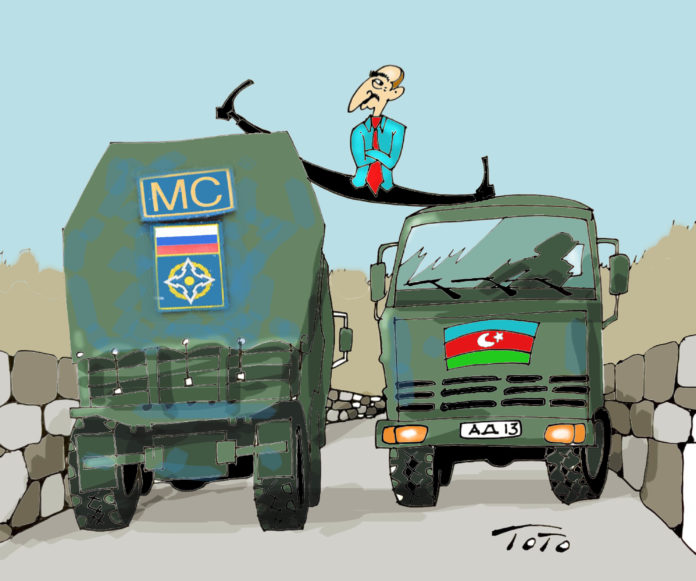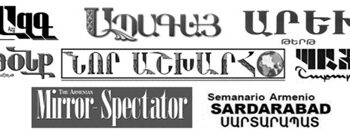Throughout history Armenians have been notoriously divided, even in the face of catastrophe, and that, more often than not, has contributed to our historic losses.
Today, as Artsakh nears the point of extinction, are we speaking with one voice? Apparently not.
We hear pro-Russian comments from Stepanakert and anti-Russian statements from Yerevan. If this dissonance were based on agreed upon disagreements, we would be gratified that finally Armenians have come to the realization that in the complex and dangerous international situations, they have devised a coordinated policy to take advantage of moving political targets. However, we are afraid the difference of positions reflects different assessments of the situation and in fact will divide support.
And to make matters worse, while different voices are heard from Armenia and Artsakh, there is no voice yet emanating from the diaspora. No massive movements seem to be in the offing and no demands nor have challenges been extended from Yerevan to the diasporan masses.
For almost a month, the Lachin Corridor has been blocked, suffocating the Karabakh Armenians, but the international community has failed to provide any remedy nor have Armenians around the world focused their desperation on a specific goal or acted collectively. The only consolation is in the Chinese adage that every crisis is also an opportunity; as Azerbaijani authorities continue the pressure, adding one demand after another, they are justifying the application of the principle of remedial cessation for the Karabakh people.
In the past decade, Azerbaijan was able to paralyze the Organization for Security and Cooperation in Europe (OSCE) Minsk Group, with the active participation of Russia. That entity held the last and best hope for the Armenian side, as it maintained that there is no military solution to the conflict and that the Karabakh status question remains unresolved. But as that hope fades, we realize that no negotiated settlement on the status could be any better than remedial cessation, which may mean self-determination.
At one point, hopes were raised that finally the United Nations Security Council would take a position, internationalizing the crisis. In fact, there is no shortage of crises around the world, but France was able to manage to place the problem on the agenda of the Security Council. And with India serving as the rotating president of the Security Council, a positive outcome was anticipated. However, after many calls to unblock the Lachin Corridor, the Russian delegation was able to defeat the planned resolution. Following verbal gymnastics from the Kremlin and various Russian spokespersons, Moscow blamed France for its own dirty game. However, Armenia’s Foreign Ministry publicly thanked France for its constructive position, making clear Yerevan had understood where to put the blame for the failure of that body.
Russia has abdicated the responsibility it had assumed through the November 9, 2020 peace declaration. As it becomes the focus of criticism from many quarters, including Armenia, the Russian authorities continually reassure the public that their peacekeeping forces are hard at work to unblock the corridor.
While all positions are very visible for everyone to see, public debate veers from the reality of the situation. Prime Minister Nikol Pashinyan has criticized the Russian peacekeeping forces for being “silent witnesses” to Azerbaijan’s efforts to “depopulate” Karabakh through a blockade. On the other hand, Karabakh’s Foreign Minister David Babayan, who has been stranded in Armenia, takes a different position, by stating, “The problem is not the Russians. We need to realize this. The problem is Azerbaijan and Turkey. Hitting the Russian peacekeepers at this point means strangling Artsakh. Who is to blame for all this? The Russians? Why are you following this line?”
On the other hand, the Karabakh people appealed to the international community with a message for self-determination through peaceful, massive rallies on October 30 and December 25, 2022. It is reported that 60,000-70,000 people participated in the last rally, to refute Azerbaijani leader Ilham Aliyev’s claim that only 20,000 people live in the enclave. This time around, the rally was more disciplined and purposeful, with slogans in many international languages. Unlike previous rallies, only the flags of Armenia and Karabakh were hoisted. People are united in their purpose and desire. However, some mysterious changes have been taking place in the leadership.
For example, in the last rally, Karabakh President Arayik Harutyunyan was nowhere to be found, while newly-appointed State Minister Ruben Vardanyan was very visible and offered concluding remarks.
A few days ago, Artsakh’s Secretary of the Defense Committee Vitali Balasanyan was dismissed and replaced by his deputy, Ararat Melkumyan. Balasanyan was rumored to have entered into negotiations with Azerbaijani authorities.
In their turn, media in Baku pretended that secret negotiations were underway with the Karabakh leadership.
As far as Vardanyan is concerned, many people in Karabakh see him as a savior who has given up a billionaire’s life of comfort and settled in a danger zone to help his people, while Azerbaijan on the other hand is worried about the potential of his leadership.
President Aliyev castigated him as an oligarch who has robbed the Russian people and settled illegally in Karabakh and that therefore, he should leave the area. Azerbaijan’s Foreign Minister Jeyhun Bayramov continued along the same lines at the failed foreign ministers’ meeting in Moscow last December, stating that Baku will never talk to him. He also insinuated that Moscow owns him.
Russian Foreign Minister Sergey Lavrov reacted vehemently that Russia has no connection with him nor will have any relations with him in the future.
It looks like Vardanyan has become a political hot potato between Baku and Moscow.
Analyst Hovsep Khurshudyan believes that these attacks render him a hero, rather than a pariah.
Is Yerevan talking to him or to anybody in Stepanakert? That is a moot question.
The crisis gave an opportunity to Armenian Premier Nikol Pashinyan to prove his true mettle by galvanizing the diaspora and making it a potent component of his foreign policy, by rallying the church and its worldwide affiliates around him and by making peace with the opposition. But Pashinyan has not risen to the challenge and seems to be engulfed in a siege mentality, isolating himself from reality and letting things take their own course.
There is certainly a crisis of leadership in Armenia and the diaspora; in the meantime, the outcry around the world has failed to dampen Aliyev’s arrogance, as he not only ignores any requests to put an end to his murderous ways, but instead ratchets up the misery by periodically cutting off electricity to Artsakh.
The Armenian Mirror-Spectator







